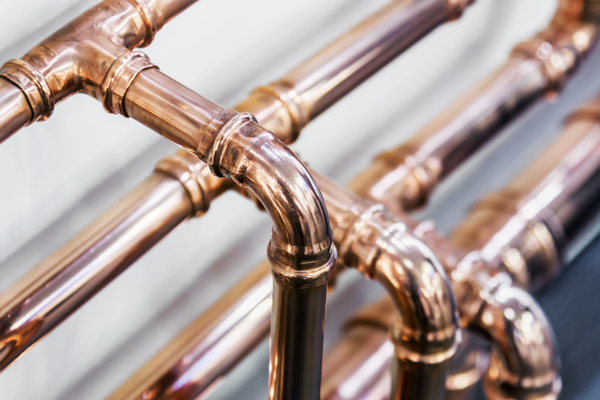
It’s not unusual to hear the metal pipes in your home plumbing make loud banging noises when an appliance draws water or you turn off a faucet. Unfortunately, this sound, commonly referred to as “water hammer,” isn’t just annoying – it could damage your plumbing system. Referred to in technical circles as hydraulic shock, water hammer is the result of water stopping or changing direction very quickly. When this happens, a shock wave goes through your pipes, causing them to move, shake, and bang together.
Water hammer in pipes has been around since the first century B.C. when Roman architect, Marcus Vitruvius Pollio noticed them in the public water system. Fortunately, we’ve since developed ways to deal with them. Below you’ll find everything you need to know about hammering pipes, the potential problems they can cause and how you can stop them in your home.
What is a water hammer?
Water hammer is a pressure surge that occurs when a fluid is forced to stop or change direction at a fast pace. This sudden momentum change causes a shockwave that leads to water banging and shaking pipes. Water hammer gets its name from the sound of water “hammering” into the valves and pipes.
We’d like to note that sometimes water hammer happens for simple reasons such as high water pressure. You can determine if your water pressure is the cause by checking your water pressure gauge and adjusting it as needed. If you’re unsure about your water pressure, a licensed plumber from Mike Diamond can help test and regulate it for you.
Is water hammer dangerous?
Water hammer damage can wear away at pipe joints and valves over time. Worn out pipes may burst, start leaking, or detach from their connections. If your surge occurs because of high water pressure, it might also pose a physical risk. High water pressure can physically harm people who don’t expect a shower that’s too hot or too forceful.
How to fix water hammer.
There are a number of ways you can fix water hammer and stop water pipes from banging every time you use your faucet. We’ll list the most commonly used and effective solutions.
- Securing loose pipes. If your pipes aren’t secured, even mild water hammer could force them to bang and shake. Securing loose pipes is the easiest and most cost effective way to address the problem. Tighten loose pipe straps or hangers, wrap segments of pipe in pipe insulation to act as shock absorbers, or install additional straps or hangers to secure your pipes at the stud or joist. This solution won’t fix extreme cases, but it will help prevent damage from mild cases.
- Install an air chamber. Water hammer happens when flowing water suddenly stops inside a pipe. The water slams against the pipe valves that just closed and creates a shockwave that travels back through the pipe. If you install an alternate route for water to rebound after the valve closes, then that water won’t slam into the valve wall. An air chamber is a short section of vertical pipe installed near potentially-problematic valves. It gives water and excess force a place to go when you close your valves. A professional plumber can retrofit plumbing with pipe air chambers quickly and easily.
- Install mechanical water shock arrestors. Mechanical shock arrestors are the best solution to severe hydraulic shock problems when you can’t install an air chamber. They’re a device consisting of an air bladder and spring that you install around affected plumbing joints. Mechanical water shock arrestors do exactly what their name implies. They absorb and stop the shockwave created when water slams against closed valve walls, neutralizing it before it can reverberate through your pipes.
Stop Water Hammer Noise in Your Home
Leaving small plumbing problems alone only leads to more significant plumbing problems down the line. If you’re wondering how to stop banging in your water pipes, give Mike Diamond a call. Treating that water hammer sound and the damage it may be causing is a win for you and your home’s plumbing. We’ll send one of our technicians to diagnose and fix your issue as quickly and efficiently as possible.